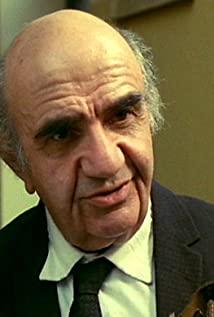The eighth of "Ten Commandments" is the most deliberate story in all the films. The commandment corresponding to the story of this episode "Do not bear false witness to frame others" was directly discussed in the episode, and Keith in "Kiess" The political factors that were avoided as much as possible and the living conditions of the Polish people mentioned in the book Lowski on Kieslowski also appeared one by one in this episode, such as curfew, shortage of supplies, etc. Wait.
But despite this, the story has become dull. Its main scenes are concentrated in the classroom and Sophia's house. The dialogue of the characters has become the whole driving force of the narrative. This is a "story" that is told. A little bit of the exchange spells out a complete past, which is in line with the developmental clues of the film, because it itself is the process of another woman, Elizabeth, looking for old traces.
Elisabeth, a Polish Jew, approached Sofia as a translator of Professor Sofia's writings and listened to her teaching moral ethics in her classroom. During the period, Elizabeth told the story of a Jewish girl. It was after the Nazi occupation of Warsaw. At that time, the father of the six-year-old girl was sent to a concentration camp. The friend who was in charge of taking care of her had to find another way for her. The only person who promised to adopt her was One condition is that the girl needs to have an official "certificate of baptism". The person who takes care of the girl finally finds a couple who are willing to pretend to be the godfather and godmother of the little girl. When this person leads the little girl to come When they arrived at the couple's residence, they were told that the couple had changed their minds and stopped giving the little girl a proof. The reason she gave was the Ten Commandments of God: Do not bear false witness.
In the process of telling this story, the camera has always captured the subtle changes in expressions between Sophia and Elizabeth, and the "angel" also appeared in the classroom, watching the slightly flustered Sophia, all of which are easy to guess the ending, Elizabeth It was the little girl, and Sophia was the young woman who temporarily rejected her.
Immediately after this story was told in class, some people questioned that God's commandment is "You shall not bear false witness to frame others", but no one was harmed in the process of giving false testimony for the little girl, so this must not be done to God The reason for lying was obviously an excuse, and Elizabeth was very pleased that someone immediately pointed out the crux of the problem. In fact, the purpose of her visit was to know why she was rejected for such a reason in the first place.
The results were revealed shortly after, because Sophia's husband was a member of an underground resistance group, and they received information that Elizabeth's guardian was a Nazi informant, and they tried to capture the group through Elizabeth's adoption process. , As a last resort, Sophia had to find such a reason to reject Elizabeth.
Elizabeth has been following Sophia for forty years. She saved many Jews after Elizabeth's incident. Her behavior made Elizabeth even more curious about the reason why she rejected her in the first place, so she finally embarked on the road of search, but we immediately It is clear that the answer to this question is not the core story that this film is going to tell. This incident is just a clue. The reason for the predicament of all the characters is actually the guilt and indebtedness in their respective hearts. These burdens affect the story. and changed each of them.
The first of course is Sophia. When she pushed a little girl's life into the unknown darkness for a hasty reason, her life has actually been changed. One of the characteristics of Elizabeth when she went to see her) was to pray silently in her heart that she was still alive. Sophia appeared in the movie as a philosophy professor. She was strict with herself and respected kindness all her life. These actions all have a hint of guilt, and she is making up for the "mistakes" she made at the beginning with more kindness. Although the responsibility is not hers, she has never been able to get out of this predicament.
As for Elizabeth, as a rescued child, her plight did not disappear. The fact of being rescued itself became her lingering demon. She regarded being rescued as a shame, and she did not come back for many years. The reason is because she doesn't want to see these shameful witnesses. She thinks it's unfair that some people can be the savior and some people can only be rescued. This kind of knot in her heart can actually show her gratitude for being rescued, but This gratitude has become a perverted burden because of her own inability to let go.
This reminds me of another story about Jews fleeing for their lives. A father and son are trying to escape from the Nazis. They have two shelters to choose from. One is always benevolent to their family, and the other is always by them. The family they took care of, the father and son disagreed on this matter, and the son naturally thought that this was an opportunity for the "beloved" family to repay them, so he chose them, while the spicy father chose the family who had been taking care of them . As a result of the incident, the benevolent people still took care of the father as in the past, but the benevolent family sold their son to the Nazis. This story seems to be contrary to common sense, but it just shows that this kind of benevolence brings about. The pressure that came, the family that was taken care of, chose the most extreme way to repay his benefactor, because only when the person who gave you the favor dies, the debt will be wiped out. Although Elizabeth has no extreme behavior in the film, she is troubled by the same kind of perverted humility.
After that, Sophia led Elizabeth to meet the little tailor who wanted to take her in. When she revealed her identity, the old tailor turned a deaf ear, and very coolly refused Elizabeth to talk about any past events during the war. In the film, the tailor was treated unfairly because others gave false testimony, but the reason for his refusal of the past must also be the trouble caused by his failure to rescue Elizabeth, and he is the most stubborn and evasive of all, when the film At the end, when Elizabeth has to leave the tailor, the ending of the film and the script are slightly changed. Instead of using the ending of Sophia to meet the priest in the script to continue to reinforce her guilt, it chooses the ending of the present to highlight the relationship between individuals. Facing the same predicament psychological contrast, when Elizabeth and Sophia stood outside the tailor shop smiling and talking, it implied that their hearts were resolved at this moment, while the old tailor was hiding in the house and watching all this through the bars, It is a metaphor for another situation. There is no doubt that war can be replaced in this story. It is only one of the reasons for the moral dilemma, and what Kieslowski intends to discuss is In this different way of dealing with "moral burden", the two diametrically opposite situations of giving and being graced can actually be transformed into the same psychological burden because of one's own psychological positioning, and the universal description of this self-restraint, But it is to highlight the importance of self-decompression and self-breakthrough in the face of this situation.
View more about Dekalog reviews











